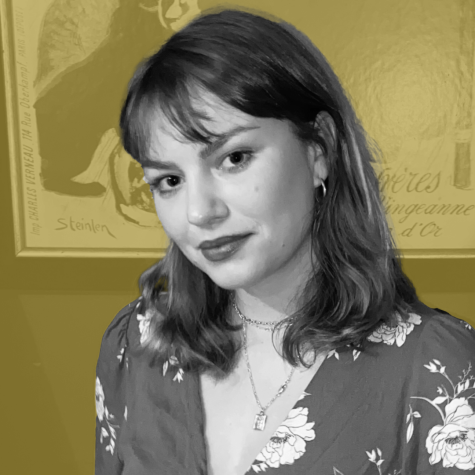
Saskia Hatvany (she/her) is the editor-in-chief of Xpress magazine. She is a freelance writer and photojournalist from Oakland, California. Her work has...
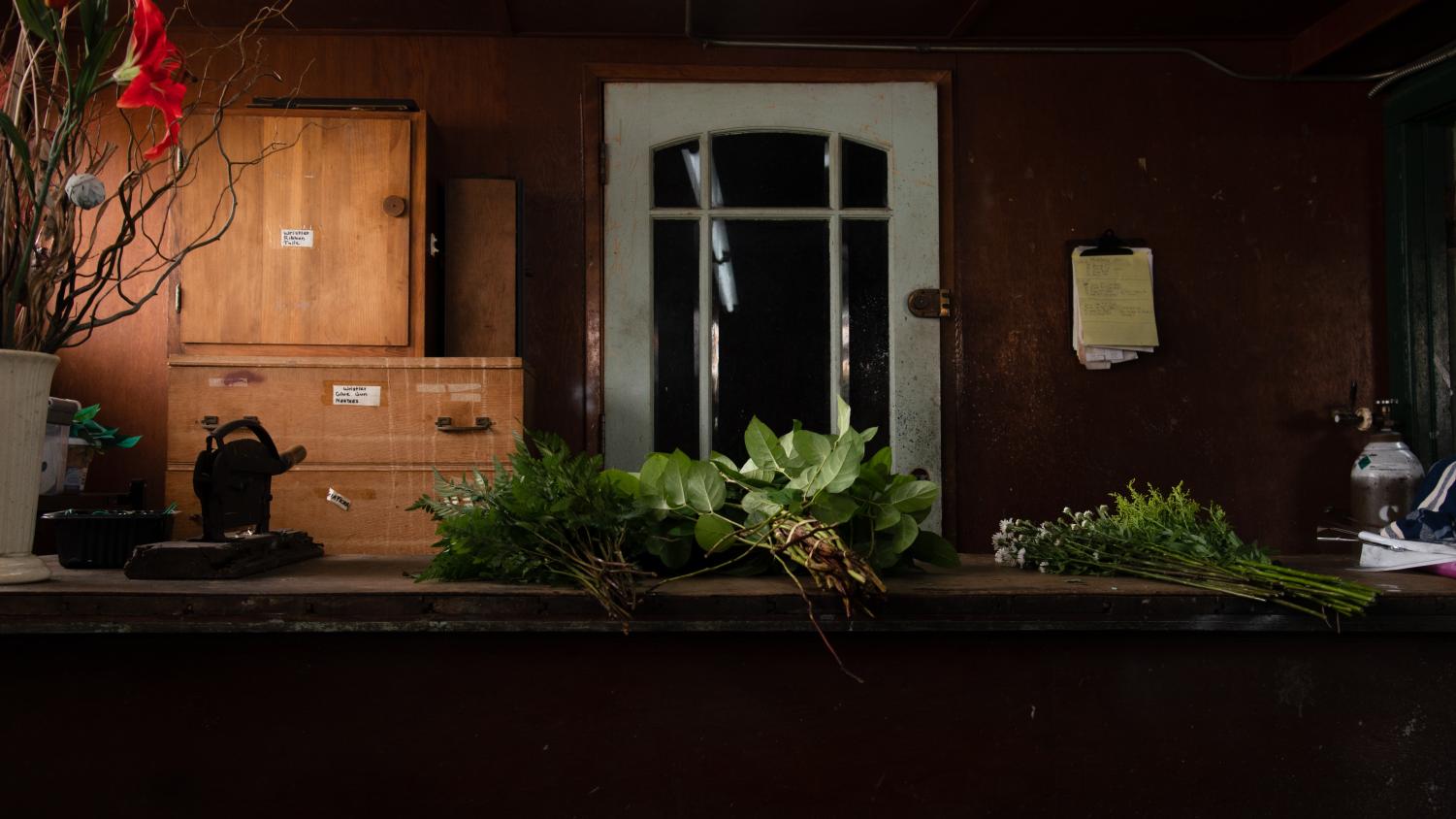

The around-the-clock job of funeral workers.
April 22, 2022
When Thomas Halloran gets ready to embalm a body, he makes sure to remove the silver watch from his left hand and hide it from view. He won’t look at the clock’s hands until he has completed his job, which sometimes isn’t until the early hours of the morning.
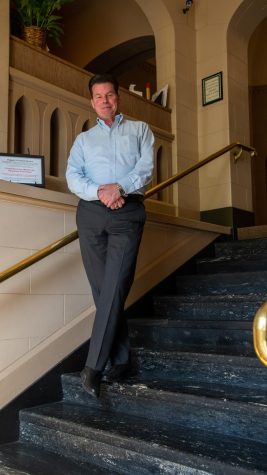
“It’s 24/7,” said Halloran, an embalmer and manager at the Duggan Funeral home in San Francisco. “It’s not uncommon that I get more done personally after 5 p.m. when everyone leaves because I’m not interrupted.”
Halloran refuses to look at the clock, because he believes that time is irrelevant when it comes to doing his job right, which can sometimes mean working through the night to carefully restore and preserve the deceased. To him, it’s all part of the job — one that he has felt called to his whole life.
Halloran was just 7 years old when he held his mother’s hand and walked behind the flag-draped casket that carried his grandfather’s body. He remembers every detail, from the church service in San Francisco to the police-escorted limousine ride down to Golden Gate National Cemetery where his grandfather, a World War I veteran, was laid to rest. It was the first of many family funerals throughout his childhood.
“Even back then, I thought, this is kind of cool: fancy cars, a lot of pomp, everyone was dressed in black,” Halloran said, sitting behind the dark wooden desk in one of the rooms of the funeral home, the decor of which has remained largely untouched since 1932 when the home opened.
By the time he was a teenager, he was certain that he wanted to be a funeral director and spent his free time working as a florist and delivering flowers to funeral services around town. He got his first job as an apprentice at a funeral home when he was 18-years-old. Now, after 42 years of experience in the funeral industry, Halloran concedes that his job can be taxing at times.
“You’re dealing with emotional people, five to seven days a week. And it’s really, really, really rare to have a funeral where people are coming in and saying, ‘Isn’t this wonderful? I’m having such a good time. I’m so glad she’s dead. That’s rare,’” said Halloran. “It weighs on you.”
[robo-gallery id=”21591″]
Halloran is one of approximately 24,700 funeral workers in the United States, according to the Bureau of Labor statistics. That number includes morticians, funeral arrangers and undertakers but does not count the array of job titles that work in and around the funeral industry. Many of those who work in the business of death face an emotionally charged and demanding job that often requires them to work around the clock.
Reuben Houston, owner and funeral director of Colma Cremation & Funeral Services, frequently works through the weekend, even though the business is technically closed on Sundays.
“I’ve always been a go-getter. So it’s like, do I pass it on to one of my staff to pick up the body? Or do I just do it myself and let my staff just enjoy the weekend?” he said. “But yeah, we’re still seven days a week, 24 hours a day.”
Houston, 44, is going on his 24th year in funeral work. His kids both grew up accustomed to their dad having to leave at a moment’s notice to pick up a body. Before his daughter began attending college, she would help out around the funeral home. Now, his 12-year-old son is becoming more involved in the business too.
[robo-gallery id=”21556″]
“They were born into it. Sometimes daddy had to run to removal real quick. My daughter would jump, basically in the front seat,” Houston said. “She never shared with me her true feelings about what she thought about being around the bodies and everything, but she’s always been helpful.”
Many who end up working in the funeral business do so because of their family legacy. Family-owned funeral homes were once the norm in San Francisco, where there used to be over 40 privately owned funeral homes, according to Halloran. Now there are just two. Many of the remaining businesses have been bought by large corporations — a practice criticized by Houston, who believes that corporate homes often charge more and offer lesser quality services compared to family-owned affairs like his own.
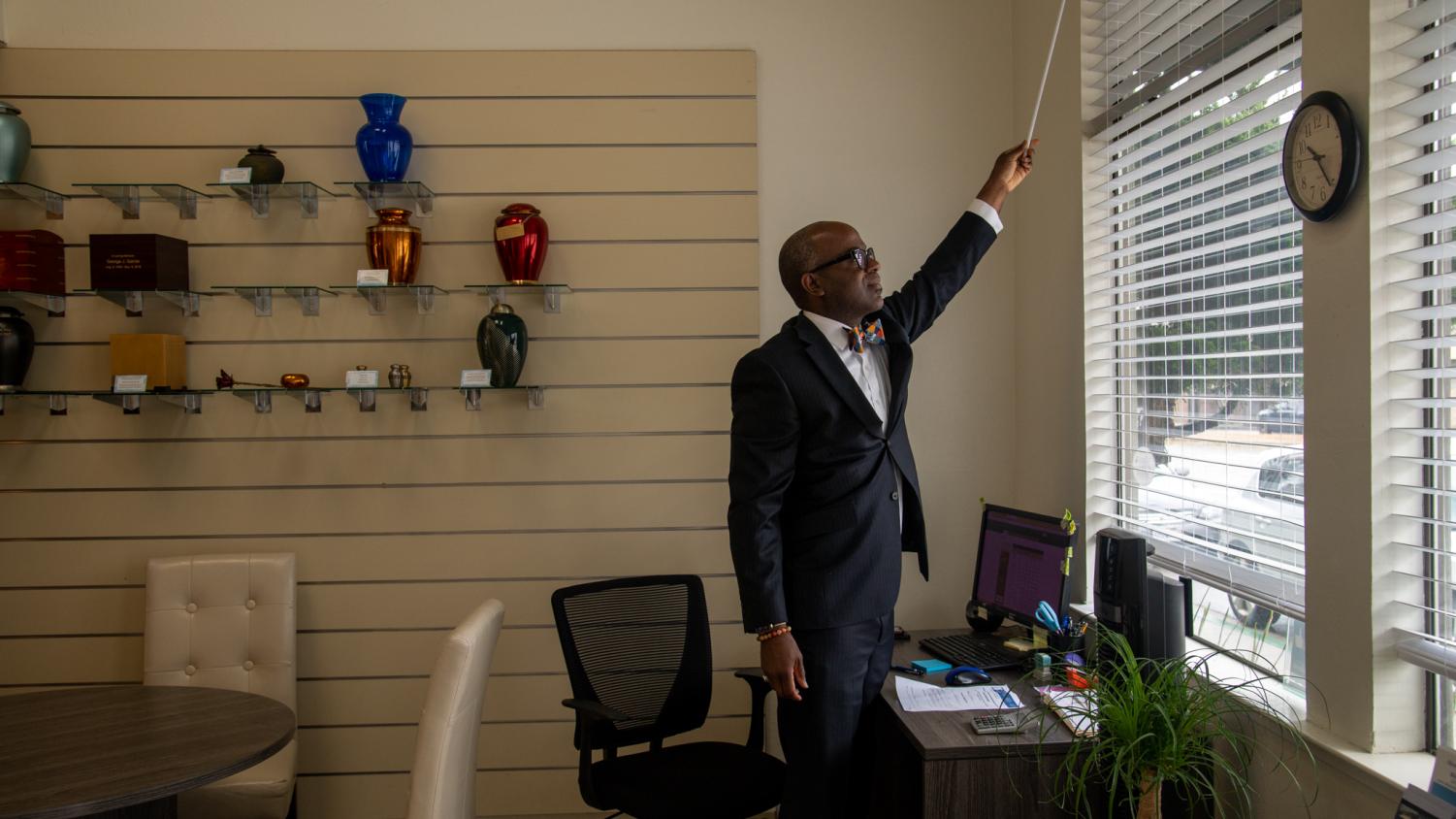
“This is a ministry. You got to have a passion. You have to be able to show human kindness even through the difficult time that you face with these families,” Houston said.
Just a few months before the outbreak of the COVID-19 pandemic, he purchased the Colma Cremation & Funeral services. Since then, the work has been nonstop.
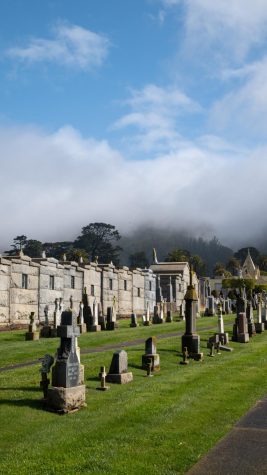
“We had to turn away families. We were just so busy. We couldn’t house the number of bodies that were even at the morgue,” he said. “There were sleepless nights at the office…no light at the end of the tunnel at all.”
Aside from the difficulties caused by the coronavirus, Houston said that burnout is not uncommon among funeral workers.
“It is mentally and emotionally draining. Sometimes I find myself snapping at the people who I really care about the most and who I love and adore because I’m stressed out,” he said. “So emotionally, yeah, I’m burnt out right now.”
Not much is known about the mental health of funeral workers. One of the few studies on the subject, published in the American Journal of Health and Behavior in 2020, surveyed just 132 funeral workers. Over 60% of the participants reported that they had been struggling with stress, depression or problems with emotions in the last 30 days. The study also found that substance abuse and weight management were commonly reported problem in the field.
Even for those who spend decades in the industry, there are aspects to the job that some never get used to. Houston said that he still shudders when he sees bodies sometimes, especially those that have been through traumatic accidents.
“You don’t get desensitized, not at all,” he said. “When it comes to kids, it’s the hardest thing. I’ve buried so many young people in my lifetime. It’s really hard.”
Just one block away from Houston’s office, Troy Milan walks the green candy-colored grounds of the Italian Cemetery in Colma. From the main office at the top of the hill, the view is a seemingly endless sprawl of cemetery grounds. Across a busy street in the distance, the blue and white building of the Greek cemetery peeks out from the trees. It’s one of the 17 cemeteries in Colma, a two-square-mile town that was established at the border of San Francisco in 1924 to serve as burial grounds for the growing number of deceased during the Gold Rush.
“This is like a little town of its own. We have something like 78,000 permanent residents,” Milan said, gesturing to the rows of marble vaults that line the top of the hill of the Italian Cemetery.
Milan is the director of community relations at the cemetery, where he has been working for the last five years. A former social worker, he was growing tired of the emotionally demanding work, so he began to work part-time at the cemetery.
“I never had any issues with cemeteries. I think that Western society makes cemeteries spooky, like movies,” he said.
He enjoys walking the cemetery grounds and the regular hours and slow pace of the cemetery compared to his previous jobs, which often required tedious commutes. But he also likes feeling like he’s a part of something bigger than himself.
[robo-gallery id=”21589″]
“I was working for an E-commerce [company], and it was always like… we could do better next quarter. But at the end of the day, we all end up here in some form or another,” said Milan.
Unlike funeral homes, cemetery workers tend to have a more tame schedule. Still, the job can sometimes be shocking, he said.
“I don’t know these people at all…but to hear that wailing, that can really cut to the core sometimes,” said Milan. “Usually when I meet somebody, it’s the worst day of their life… but if you can help them out, then it’s really rewarding.”
Colma’s deceased greatly outnumber its living, and according to the town’s website, there are over 1.5 million buried in the two-acre municipality. The town’s main street is lined with funeral-oriented businesses, including florists and monument carvers, who create the headstones, plaques and various monuments that decorate the surrounding cemeteries.
[robo-gallery id=”22048″]
Fontana Monuments has been owned and operated by the Fontana family for over 100 years. As a kid, Mark Fontana used to wander into his grandfather’s workshop, and marvel at the giant slabs of granite stacked one on top of the other. Many of the raw slabs that line the walls of the workshop will be carved into grave markers.
“I don’t think it was an expectation that I went into this, but as a kid being here in the shop, I just liked it,” he said. “It had everything you needed: noise, explosions, stuff going on and yelling…and then at the end of the day, there was something that you did that would outlive everybody.”
Despite being just a few hundred feet from the Italian cemetery and from the above-ground vault where his Fontana family members are buried, Fontana said he never thought about his own burial wishes.
“My kids, they can figure out what they want to do,” he said. “To me, it’s about this. It’s about making stuff.”
[robo-gallery id=22036]
Rich Vaccari, who runs the flower shop down the street, has a similar family legacy. His grandparents opened the business over 100 years ago, and Vaccari has been working there almost his whole life. The old shingled building rumbles with the passing cars as the structure almost sags at the corners. The name of the shop, “Flowerland,” printed in green block letters along the side, speaks of an era when Colma was a rural plot of land outside of the city, not a sprawling urban cemetery.
His wife Maria Vaccari, who runs the business with him, trims flowers in the corner. With hardly any help, the pair run the small shop seven days a week.
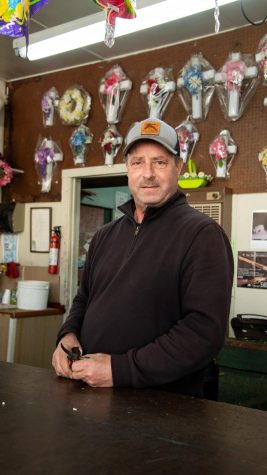
“We got married in Tahoe, and we were only gone for a day,” joked Vaccari. “We love doing what we’re doing, so this is home. When we retire, well, that’ll be boring.”
As for Halloran, he jokes that he is married to his profession but that he also can’t wait for the divorce.
“Over the decades, I’ve learned that you need not absorb the grief of others because…you’re going to have your own losses, your own joys, your celebrations,” he said. “You’re here to provide a professional service and do the very best you can to make this rite of passage, this lifecycle event, pleasing, memorable so that they walk away with a good feeling in honoring a life lived.”
Morgan Ellis contributed to this story.
[robo-gallery id=”22044″]

Saskia Hatvany (she/her) is the editor-in-chief of Xpress magazine. She is a freelance writer and photojournalist from Oakland, California. Her work has...